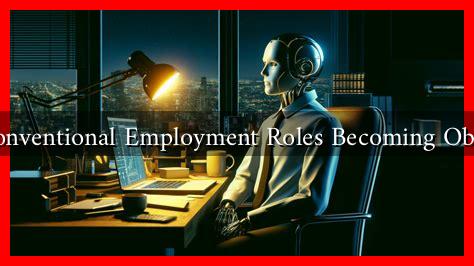-
Table of Contents
Are Conventional Employment Roles Becoming Obsolete?
In recent years, the landscape of work has undergone a seismic shift, prompting many to question the relevance of conventional employment roles. With the rise of technology, remote work, and the gig economy, traditional job structures are being challenged. This article explores whether conventional employment roles are becoming obsolete and what this means for the future of work.
The Changing Nature of Work
Historically, conventional employment roles have been characterized by long-term contracts, fixed hours, and a clear hierarchy within organizations. However, several factors are contributing to a transformation in how work is structured:
- Technological Advancements: Automation and artificial intelligence (AI) are reshaping industries, leading to the displacement of certain jobs while creating new opportunities.
- Remote Work: The COVID-19 pandemic accelerated the adoption of remote work, demonstrating that many roles can be performed outside traditional office settings.
- Gig Economy: Platforms like Uber, Fiverr, and Upwork have popularized freelance and contract work, allowing individuals to work on a project basis rather than in permanent roles.
Statistics and Trends
To understand the extent of this shift, consider the following statistics:
- According to a report by McKinsey, up to 25% of the workforce in advanced economies could be displaced by automation by 2030.
- The Freelancers Union reports that 36% of U.S. workers are part of the gig economy, a number that is expected to grow.
- A survey by Buffer found that 97% of remote workers would recommend remote work to others, indicating a strong preference for flexible work arrangements.
Case Studies: Companies Embracing Change
Several companies have successfully adapted to the changing employment landscape, illustrating the potential for new work models:
- GitLab: This all-remote company has no physical headquarters and employs over 1,300 people across 65 countries. Their model demonstrates that productivity can thrive outside traditional office environments.
- Airbnb: The company has shifted from a conventional employment model to a more flexible approach, allowing employees to work remotely and choose their own hours, which has led to increased job satisfaction.
- Upwork: As a platform for freelancers, Upwork has revolutionized how businesses find talent, allowing companies to hire skilled professionals on a project basis rather than committing to full-time roles.
The Pros and Cons of Conventional Employment
While conventional employment roles are being challenged, they still offer certain advantages:
- Job Security: Permanent roles often come with benefits such as health insurance, retirement plans, and paid leave.
- Career Development: Traditional employment can provide structured career paths and opportunities for advancement within an organization.
- Team Collaboration: In-person work can foster stronger relationships and collaboration among team members.
However, the downsides include:
- Rigid Schedules: Conventional roles often require adherence to strict hours, limiting flexibility.
- Limited Autonomy: Employees may have less control over their work environment and tasks.
- Stagnation: Some may find traditional roles stifling, with limited opportunities for innovation or creativity.
Conclusion: The Future of Work
As we move further into the 21st century, it is clear that conventional employment roles are evolving rather than becoming entirely obsolete. The rise of technology, remote work, and the gig economy is reshaping how we think about work. While traditional roles still offer benefits, the demand for flexibility, autonomy, and innovation is driving a shift toward more adaptable work models.
Ultimately, the future of work will likely be a hybrid model that combines the best aspects of conventional employment with the flexibility of freelance and remote work. As organizations adapt to these changes, both employers and employees must remain open to new possibilities and redefine what work means in a rapidly changing world.
For further insights on the future of work, you can explore resources from the McKinsey Global Institute.

